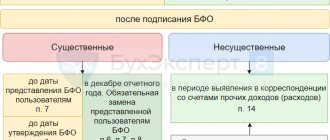Accounting for third party services
Services of third-party organizations are a type of activity that does not have a material expression; the result of the service is sold and consumed immediately in the process of the organization’s economic activities (clause 5 of Article 38 of the Tax Code of the Russian Federation). If there is a material component, then this is work (clause 4 of Article 38 of the Tax Code of the Russian Federation):
In accounting, an organization can write off all direct expenses only for services (Letter of the Ministry of Finance of Russia dated February 22, 2007 N 03-03-06/1/114).
The primary accounting documents confirming the receipt of services from third-party organizations are:
- Service agreement;
- Certificate of services rendered, signed by the customer and the contractor;
- Invoice received.
Services provided by third parties may include:
- Communication services (discussed in example 1);
- Pre-sale preparation services (discussed in example 2);
- Cash register maintenance services (discussed in example 3);
- Housing and communal services;
- Storage services;
- Consulting services;
- Transport services;
- Training services;
- Auditing services;
- Legal services;
- Real estate services and so on.
Standard accounting entries for services received from third parties:
| Debit Account | Credit Account | Wiring Description | A document base |
| 26 | 60 (or 76.05) | Reflection of the cost of the service received (excluding VAT) | Certificate of services rendered, Invoice received |
| 19.04 | 60 (or 76.05) | The amount of VAT on the cost of the service received is reflected | |
| 68.02 | 19.04 | VAT amount accepted for deduction | |
| 60 (or 76.05) | 51 | Payment to the counterparty for services rendered | Bank statement |
| 90.02 | 26 | Write-off of the cost of services received to cost of sales |
Standard accounting entries when receiving services free of charge:
Get 267 video lessons on 1C for free:
- Free video tutorial on 1C Accounting 8.3 and 8.2;
- Tutorial on the new version of 1C ZUP 3.0;
- Good course on 1C Trade Management 11.
| Debit Account | Credit Account | Wiring Description | A document base |
| 91 | 60 (or 76.05) | The cost of the service received free of charge is reflected | Agreement for the provision of services free of charge |
| 60 (or 76.05) | 91 | Income from services received free of charge is reflected |
A sample contract for the provision of services free of charge can be downloaded here ˃˃˃
Accounting for the costs of delivering goods to the organization's warehouse
Expenses for the current month are divided into direct and indirect. Direct expenses include the cost of purchasing goods sold in a given reporting (tax) period, and the amount of costs for delivery (transportation costs) of purchased goods to the warehouse of the taxpayer - the buyer of the goods, if these costs are not included in the purchase price of these goods.
— consignment note in form N TORG-12 (hereinafter referred to as TORG-12), approved by Decree of the State Statistics Committee of Russia dated December 25, 1998 N 132. This document is used to formalize the sale (release) of inventory items to a third-party organization. Drawed up in two copies. The first copy remains with the organization handing over the inventory items and is the basis for their write-off. The second copy is transferred to a third party and is the basis for the recording of these valuables;
. This element includes the amount of depreciation charges for the complete restoration (renovation) of elements of fixed production assets (fixed assets) and intangible assets, calculated according to the norms of their book value, taking into account the established service life limits. Unlike other cost elements, they are not cash costs of the enterprise.
Since 2001, contributions for social needs take the form of a unified social tax (UST), which is credited to state extra-budgetary funds: the Pension Fund of the Russian Federation, the State Social Insurance Fund, and the Compulsory Medical Insurance Fund. The basic UST rate for employers is 26%;
- Forms of non-profit organizations
- How to find out if an organization has been liquidated
| Bercc | |
| Bercc | |
| Tanya | what will be the result? |
| mos-ad | find someone who is good at programming and pay him |
| mikecool | (0) why? |
| Zanuda | (0) That is, boom. thinks that they could provide you with services for, for example, minus 100 rubles? And how do you want to pay “-100” rubles? Cashless? |
| mos-ad | (4) maybe they use discounts or adjustments |
| Zanuda | (5) Maybe. But the essence of this document execution remains that they provided rubles. Should I pay VAT on them “-18” rubles? That is, for compensation? Fiscals will be happy... |
| AAAChel | I also encountered this, and the city administration demanded from them |
| mos-ad | (6) -18 rub. this is for additional accrual |
| Zanuda | (8) Fiscals will be happy anyway |
| mos-ad | (9) What are you up to with the fiscals? in (0) nothing is said about them |







